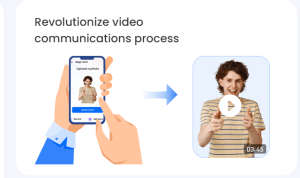The advent of voice cloning technology has made it easier than ever-- and frankly, it may be the best that it has ever been in replicating human voices realistically. The myriad applications of this innovation are numerous, from entertainment to customer service and even personal assistant. In the sections below, we take a look at some of the voice cloning platforms available, what they provide and how they are doing in the tech industry.
Voice Cloning Market Key Players
Here are some of the popular companies that are leading the race in providing online services for voice cloning. All are well-suited for the needs of various users, from developers to casual users, and they each provide unique aspects.
1. Overdub Descript has a feature called Overdub that lets you either clone your own voice or select from a handful of default voices. Especially used by podcasters and people who create videos. The quality and - mostly - the quantity of audio samples you provided play a major role in the precision of the clone. Descript suggests you at least 10 minutes to make a realistic clone.
2. iSpeech iSpeech provides Text-to-Speech and voice cloning services designed to meet the everyday and enterprise needs of different individuals. [Their technology is] utilized in eLearning modules, online audiobooks, among other web applications. iSpeech is a popular choice due to its ability to cope with diverse languages and accents.
3. Respeecher Respeecher specializes in media and provides voice cloning, allowing filmmakers and media creators to do the impossible: for the chosen actor to speak the words in the voice of another actor, even without having the voice owner in the studio. Particularly we saw them apply this in historical documentaries where they wanted to bring back to life the voices of historical figures.
Accessibility and Qualityibernate access to data
There is some kind of pay wall outside of applications (subs/purchase) and there needs to be a way to generally incentivize licensing without depending upon explicit components of these practices. It would be charged from $10 up to more than $100 depending on characteristics and utilization limits. Also, cloned voice quality is dependent on clarity of the original recording and ambient noise levels.

Ethical and Legal Aspects
The spread of voice cloning technology poses what many see as a worrying threat, especially with regards to privacy, security, and potential abuse. Thus, it is incumbent upon nearly all providers to get prior consent from the voice owners to clone their voices. Plus, the laws are changing and becoming less forgiving of the way that this technology is often being abused.
Innovative Tools to Improve User Experience
Voice cloning technology is not necessarily just about trying to imitate someone voice but it is more about how to assist user endless and continuous interact with our digital platforms. For example - customer service where you can engage with customers in ways we never imagined or even - a voice that you can trust.
The voice cloning online platform acts as a gateway for all the interested folks to experience the brawn of this technology. That involves resources, tutorials and a huge community of users and developers, meaning a beginner can get as much information as they want to.
Future Prospects
AI and machine learning are continuing to tweak and perfect the accuracy of cloned voices, which just means better things for a future that looks very bright for voice cloning. Since applications will follow technology, it is safe to say that voice cloning will become essential to use in digital interfaces of the future.
As voice cloning technology is only getting better, it promises to revolutionize the way we interact with machines and spur new possibilities in how we communicate and express ourselves. As the technology evolves, it is anticipated industry wide to become an ubiquitous feature reducing the gap in the digitally enabled experience.